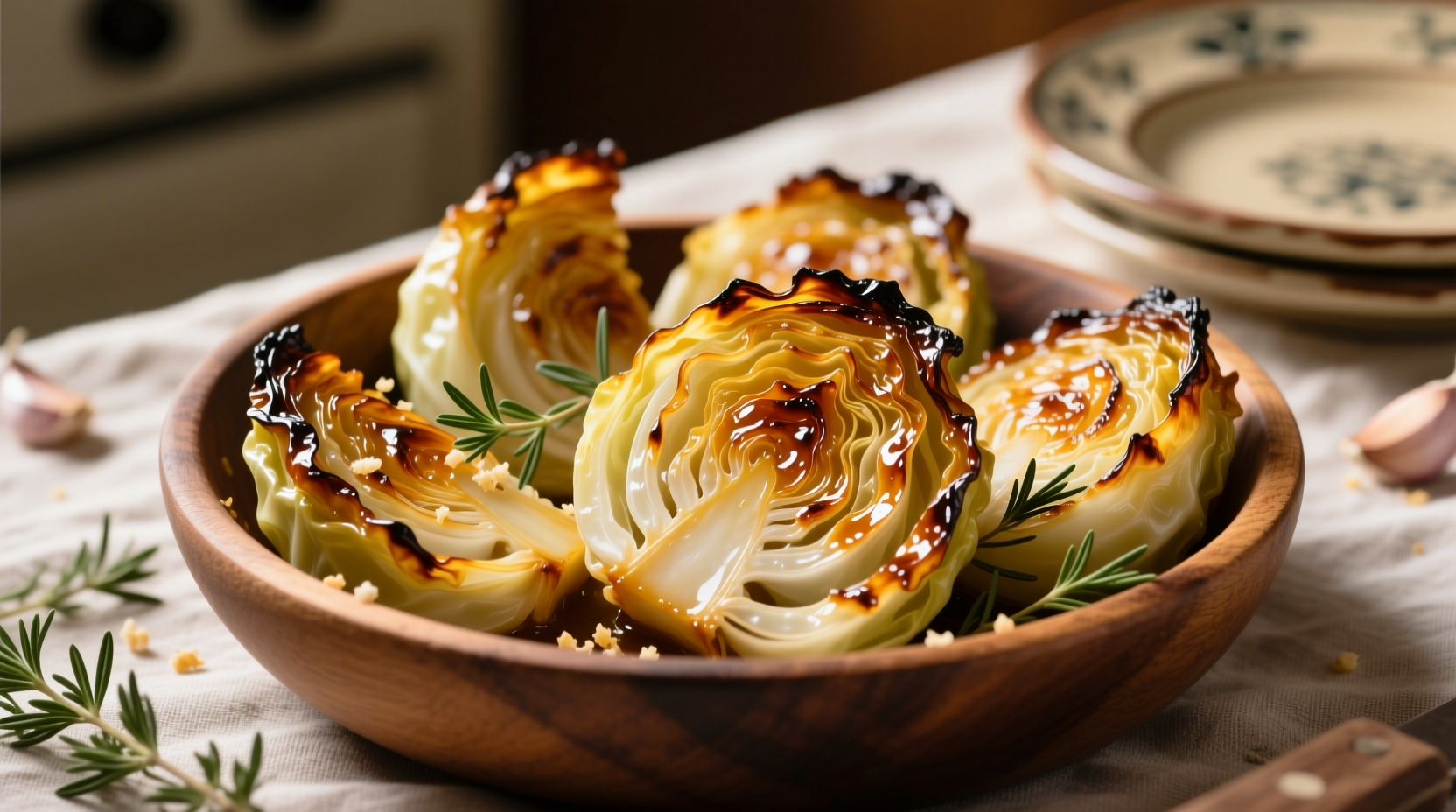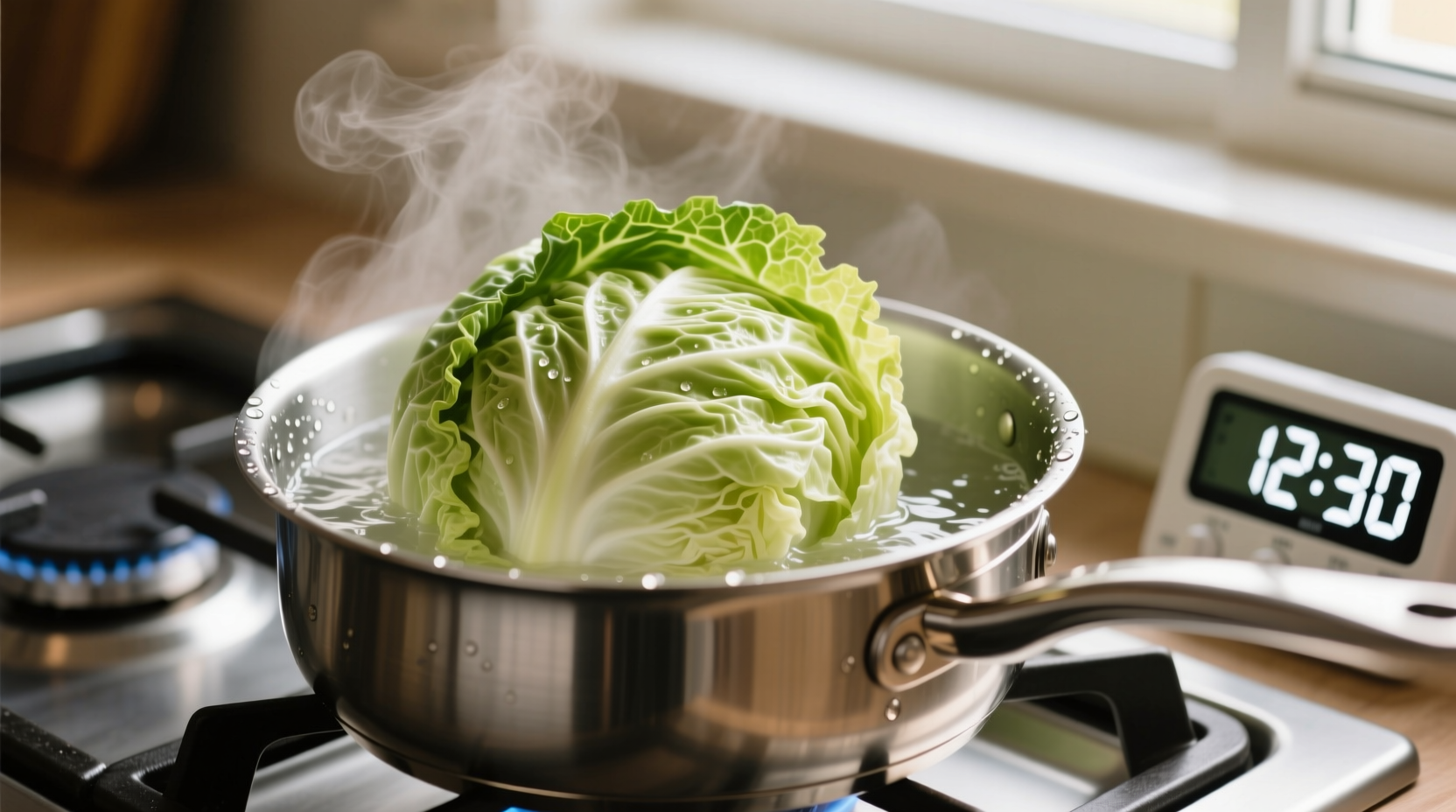Direct Answer: Cooking time for cabbage varies by method: boiling takes 5-10 minutes for tender-crisp results, steaming requires 6-12 minutes, roasting needs 25-40 minutes, and stir-frying cooks cabbage in just 3-7 minutes. The exact time depends on cabbage variety, cut size, and desired tenderness.
Getting cabbage cooking times right separates a perfectly textured side dish from a mushy disappointment. Many home cooks struggle with cabbage because they don't realize how dramatically cooking method and preparation affect timing. This guide delivers precise, tested cooking durations so you can consistently achieve ideal texture whether you're making coleslaw, stir-fries, or roasted cabbage steaks.
Why Cabbage Cooking Time Matters More Than You Think
Cabbage's unique cellular structure means it can go from undercooked to overcooked in minutes. Undercooked cabbage remains unpleasantly crunchy with raw, sulfurous notes, while overcooked cabbage releases unpleasant odors and becomes mushy. The sweet spot delivers tender-but-firm texture with sweet, mellow flavor that complements rather than dominates your dish.
| Cooking Method | Prep Required | Time for Tender-Crisp | Time for Fully Tender | Best For |
|---|---|---|---|---|
| Boiling/Blanching | Chopped or wedged | 5-7 minutes | 8-10 minutes | Coleslaw base, soups |
| Steaming | Quartered or wedged | 6-8 minutes | 10-12 minutes | Preserving nutrients |
| Roasting | Thick wedges or steaks | 25-30 minutes | 35-40 minutes | Caramelized flavor development |
| Stir-frying | Thinly sliced | 3-4 minutes | 5-7 minutes | Asian dishes, quick sides |
| Slow Cooking | Chopped | 2-3 hours | 4-6 hours | Stews, corned beef dishes |
Cabbage Varieties and Their Cooking Time Differences
Not all cabbage is created equal when it comes to cooking duration. Understanding these differences prevents texture disasters:
- Green Cabbage: Most common variety with dense, tightly packed leaves. Requires longest cooking time among cabbages. Boil for 7-10 minutes for tender results.
- Red Cabbage: Slightly denser than green cabbage with more anthocyanins. Add 1-2 minutes to standard cooking times. Acidic ingredients like vinegar help maintain vibrant color.
- Savoy Cabbage: Delicate, crinkled leaves cook faster. Reduce standard times by 20-25% to prevent disintegration.
- Napa Cabbage: Tender leaves require shortest cooking time. Stir-fry in just 2-3 minutes or blanch for 3-4 minutes.

Step-by-Step Cooking Methods with Precision Timing
Boiling or Blanching Cabbage
The most common method requires careful timing to avoid sulfur odors:
- Remove outer leaves and quarter cabbage
- Cut out tough core from each quarter
- Bring large pot of salted water to rolling boil
- Add cabbage and start timer immediately
- For tender-crisp: Cook 5-7 minutes (green cabbage) or 4-6 minutes (savoy/napa)
- For fully tender: Cook 8-10 minutes (green) or 6-8 minutes (other varieties)
- Test doneness by piercing thickest part with fork
- Immediately transfer to ice water to stop cooking if using in salads
According to USDA Food Safety and Inspection Service guidelines, properly cooked cabbage should reach an internal temperature of 165°F (74°C) for food safety, though texture indicators provide more reliable doneness cues than temperature alone (USDA FSIS).
Steaming Cabbage to Preserve Nutrients
Steaming retains more vitamin C and glucosinolates than boiling:
- Place 1 inch of water in pot with steamer basket
- Bring water to simmer before adding cabbage
- Arrange cabbage in single layer in basket
- Cover tightly and start timer
- Tender-crisp: 6-8 minutes for wedges
- Fully tender: 10-12 minutes
- Check water level periodically to prevent boiling dry
Roasting Cabbage for Maximum Flavor
Roasting transforms cabbage with caramelization and concentrated sweetness:
- Preheat oven to 400°F (200°C)
- Cut into 1-inch thick wedges, keeping core intact
- Brush with oil and season
- Place cut-side down on baking sheet
- Roast 25 minutes for tender-crisp with caramelized edges
- Roast 35-40 minutes for fork-tender results
- Flip halfway through cooking for even browning
Research from Cornell University's Food Science Department confirms that roasting cabbage at 400°F develops complex flavor compounds through the Maillard reaction while preserving more nutrients than prolonged boiling (Cornell Food Science).
Critical Factors That Change Your Cabbage Cooking Time
These context boundaries dramatically affect timing:
- Cut size: Shredded cabbage cooks in half the time of wedges
- Altitude: Above 3,000 feet, add 5-10% to cooking times
- Pot material: Cast iron conducts heat differently than stainless steel
- Starting temperature: Refrigerated cabbage adds 1-2 minutes to cooking time
- Water chemistry: Hard water can increase cooking time slightly
How to Test Cabbage Doneness Perfectly Every Time
Forget timers alone—use these sensory cues:
- Visual: Translucent appearance with vibrant color (not dull gray)
- Texture: Fork should meet slight resistance but slide in easily
- Smell: Sweet, mild aroma (strong sulfurous smell means overcooked)
- Sound: Gentle sizzle when properly seared, not splattering violently
Troubleshooting Common Cabbage Cooking Problems
Overcooked Cabbage
Symptoms: Mushy texture, strong unpleasant odor, grayish color
Solution: Reduce next cooking time by 25-30%. For immediate salvage, shock in ice water to stop cooking and use in purees or soups where texture matters less.
Undercooked Cabbage
Symptoms: Excessively crunchy, raw flavor, difficult to chew
Solution: Return to heat for 1-2 minute increments until desired tenderness. Add small amount of liquid if dry.
Bland Flavor
Solution: Boost flavor with acid (lemon juice or vinegar) after cooking, or add aromatic vegetables like onions during cooking process.
Storing and Reheating Cooked Cabbage
Proper storage maintains texture:
- Cool completely before storing
- Store in airtight container for up to 5 days
- Reheat gently in skillet with small amount of liquid
- Avoid microwave reheating which creates uneven texture
- Roasted cabbage reheats best in oven at 350°F for 10-15 minutes











 浙公网安备
33010002000092号
浙公网安备
33010002000092号 浙B2-20120091-4
浙B2-20120091-4